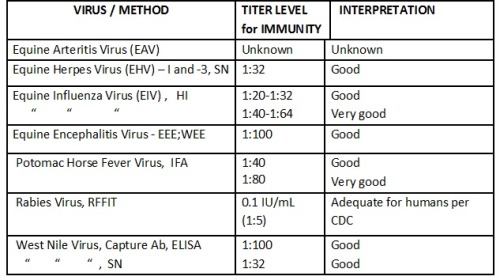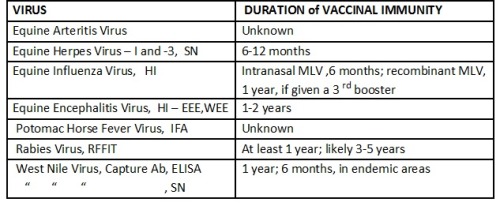Equine Vaccines & Titer Testing

Background
Now that we’ve had more than a decade of national guidelines about animal vaccines, why is a vocal cohort still reluctant to embrace this knowledge? After all, the national policies are all based on scientific facts. Do vaccine industry representatives fail to inform veterinarians about the duration of immunity and true regional and local needs for some types of vaccines? Are the risks as well as benefits of today’s vaccines adequately discussed?
Veterinary practitioners may not be inclined to “fix” what is perceived to be unbroken when it comes to vaccines. However, vaccination programs are also viewed as “practice management tools” rather than medical procedures, so a “more is better” philosophy still prevails.
The following article summarizes the current issues about equine vaccines and the alternative of vaccine titer testing.
Key Points
• modern vaccine technology has afforded effective protection of companion animals against serious infectious diseases
• but, this advancement brings increased risk of adverse reactions (vaccinosis)
• some are serious, chronically debilitating and even fatal
• must balance this benefit : risk equation
• “Be wise and immunize, but immunize wisely!” (Dr. Ron Schultz)
Vaccines & Population (Herd) Health
• to protect the population (herd) = 70 % immunized with “core” vaccines … but …..
• horses receive more vaccinations on a more frequent schedule than any other domesticated animal; this practice has horse people from all walks of life asking questions.
• vaccines are intended to protect against disease. So why are we causing disease by weakening the immune system with frequent use of combination vaccine products?
Vaccines & Latent Disease
• vaccine manufacturers seek to achieve minimal virulence (infectivity) while attaining maximum protection. This desired balance may be relatively easy to achieve in clinically normal, healthy animals but what about those with compromised immune systems?
• animals harboring latent viral infections may not be able to withstand additional immunological challenges induced by vaccines. Further, stress associated with weaning, surgery, transportation, and subclinical illness can also compromise immune function. So, reports of vaccine reactions and vaccine-related diseases are on the rise throughout the animal world.
Killed vs Modified Live Vaccines
• in contrast to dogs and cats, horses have traditionally been immunized with killed vaccines.
• safe and effective MLV equine vaccines have more recently become available.
• MLV vaccines are less expensive to make and usually produce better and more sustained protection.
• recent equine study compared killed and MLV equine herpes virus type 1 (EHV-1) vaccines, and found the MLV vaccine offered superior protection when tested by aerosol challenge.
• but, another recent study comparing killed, MLV, and live-chimera West Nile Virus (WNV) vaccines found 100% protection with all three vaccine types following challenge with virulent WNV.
Hormonal State During Vaccination
Avoid Vaccination
• period before estrus; during estrus, pregnancy, and lactation
• WNV vaccine stated as safe for pregnant mares, but in 2005 AAEP recommended vaccinating mares before breeding.
• vaccinating mares for EVA during the last 2 months of gestation causes increased risk of abortion (Broaddus et al, 2011)
Adverse Vaccine Reactions
• health issues in horses attributed to adverse vaccine reactions include fever and nasal discharge, temporary blindness, thrombocytopenia, muscle wasting or weakness, and laminitis.
“Core” Vaccines for Horses
• Equine Herpes Virus
• Equine Influenza Virus
• Equine Encephalitis Virus (EEE /WEE) *
• Potomac Horse Fever
• Rabies Virus*
• Tetanus *
• West Nile Virus*
__________________________________________________
*vaccines considered as “Core” by AAEP, 2012
Risk-Based Vaccination Guidelines (from AAEP, 2012)
These are vaccinations included in a vaccination program after the performance of a risk-benefit analysis. The use of risk-based vaccinations may vary regionally, from population to population within an area, or between individual horses within a given population. Disease risk may not be readily identified by laypersons; it is important to consult a veterinarian when developing a vaccination program.
• Anthrax
• Botulism
• EHV
• EVA
• Equine Influenza
• Potomac Horse Fever
• Rotaviral Diarrhea
• Strangles
Current Vaccine Guidelines
Why Resistance?
• failure to offer options (titers) to clients
• horse owner awareness and concerns
• ignorance and the impressionable client
• public trust of veterinarians questioned
• perceived conflict of interest ($ versus options)
• failure to recognize or denial of adverse events
• need for legal mandate standard for rabies vaccination
Practical Solutions (Education, Education, Education)
Given this troublesome situation, and the lack of evidence for the need of yearly booster revaccination, what are the experts saying about these issues? In 1995, a landmark review commentary focused the attention of the veterinary profession on the advisability of current vaccine practices. Discussion of this provocative topic has generally lead to other questions about the duration of immunity conferred by the currently licensed vaccine components.
More on Serologic Vaccine Titer Testing
Except where vaccination is required by law, all animals can have serum antibody titers measured triennially or more often, as needed, instead of revaccination. Reliable serologic vaccine titering is available from several university and commercial laboratories and the cost is reasonable.
When an adequate immune memory has already been established, there is little reason to introduce unnecessary antigen, adjuvant, and preservatives by administering booster vaccines. By titering tiennially or more often, as needed, one can assess whether a given animal’s humoral immune response has fallen below levels of adequate immune memory. In that event, an appropriate vaccine booster should be considered.
But, some veterinarians have challenged the validity of using vaccine titer testing to assess the protection status of animals against the clinically important infectious diseases. With all due respect, this represents a misunderstanding of what is called the “fallacy of titer testing”, because research has shown that once an animal’s titer stabilizes it is likely to remain constant for many years. You should avoid vaccinating animals that are already protected.
Furthermore, protection as indicated by a positive titer result is not likely to suddenly drop-off unless an animal develops a medical problem such as cancer or receives high or prolonged doses of immunosuppressive drugs. Viral vaccines prompt an immune response that lasts much longer than that elicited by classic antigen. But, interpreting titers correctly depends upon the disease in question. Some titers must reach a certain level to indicate immunity. A positive titer test result is fairly straightforward, but a negative titer test result is more difficult to interpret, because a negative titer is not the same thing as a zero titer and it doesn’t necessarily mean that animal is unprotected.
Finally, what does more than a decade of experience with vaccine titer testing reveal? In general, serum antibody titers to the “core” vaccines along with any natural exposures last considerably longer than suggested by the vaccine label booster recommendations. This corresponds with what we see clinically as the number of cases, illnesses and deaths due to these diseases has decreased in the vaccinated population. So, in contrast to the concerns of some practitioners, using vaccine titer testing as a means to assess vaccine-induced protection will likely result in the animal avoiding needless and unwise booster vaccinations.
Available Vaccine Titers for Horses
• Equine Herpes (EHV –1, and – 4) (rhino)
• Potomac Horse Fever
• Equine Encephalitis (EEE, WEE, VEE)
• Equine Viral Arteritis
• Equine Influenza
• Rabies Virus (RFFIT: non export)
• West Nile Virus Antibody Titer
Equine Titer Data


W. Jean Dodds, DVM
Hemopet / NutriScan
11561 Salinaz Avenue
Garden Grove, CA 92843
References
AAEP. Guidelines for vaccination of horses, 2001; WNV vaccination. Supplement, 2005.
AAEP, Vaccination Guidelines, 2012.
Boone TJ. Respecting equine herpes virus-1. Calif Vet 61(2):18-19, 2007.
Broaddus, CM, Balasuriya, UBR, White; JLR et al. Evaluation of the safety of vaccinating mares against equine viral arteritis (EVA) during mid or late gestation or during the immediate postpartum period. J Am Vet Med Assoc 238:741–750, 2011.
Desmettre P. Diagnoses and prevention of equine infectious diseases: present status, potential, and challenges for the future. Adv Vet Med 41:359-375, 1999.
Dodds, WJ. Big shots ! Vaccination-Parts 1-3. Equine Wellness Magazine, 2 (4, 5 & 6), 2007
Dodds, WJ. Titer testing in horses. Natural Horse Magazine 11(2): 41-44, 2009.
Goodman LB, Wagner B, Flaminio MJ et al. Comparison of the efficacy of inactivated combination and modified-live virus vaccines against challenge infection with neuropathogenic equine herpesvirus type 1 (EHV-1). Vaccine 24:3636-3645, 2006.
Hustead, DR, Carpenter,T, Sawyer, DC, et al. Vaccination issues of concern to practitioners. J Am Vet Med Assoc 214: 1000-1002, 1999.
Minke JM, Toulemonde CE, Coupier H, et al. Efficacy of a canarypox-vectored recombinant vaccine expressing the hemagglutinin gene of equine influenza H3N8 virus in the protection of ponies from viral challenge. Am J Vet Res 68:213-219, 2007.
Morgan, KD (Chair), Biological & Therapeutic Agents Committee. Vaccination Guidelines, American Association of Equine Practitioners, 2012.
Rosenthal M. Practitioners, concerned about safety, embracing new vaccine recommendations. Product Forum & Market News, Spring 2007.
Smith, CA. Are we vaccinating too much? J Am Vet Med Assoc 207:421-425, 1995.
Seino KK, Long MT, Gibbs EP et al. Investigation into the comparative efficacy of three West Nile Virus vaccines in experimentally induced West Nile Virus clinical disease in horses. AAEP Proceed 52:233-234, 2006.
Tizard I. Risks associated with use of live vaccines. J Am Vet Med Assoc 196:1851-1858, 1990.
Tizard, I, Ni, Y. Use of serologic testing to assess immune status of companion animals. J Am Vet Med Assoc 213: 54-60, 1998.
welcometofigtown liked this
silverchex liked this
helloequestrian-blog liked this
helloequestrian-blog reblogged this from drjeandoddspethealthresource
future-equine-vet reblogged this from drjeandoddspethealthresource
 nitro-grey-blog1-blog liked this
nitro-grey-blog1-blog liked this medvalkyrie liked this
drjeandoddspethealthresource posted this